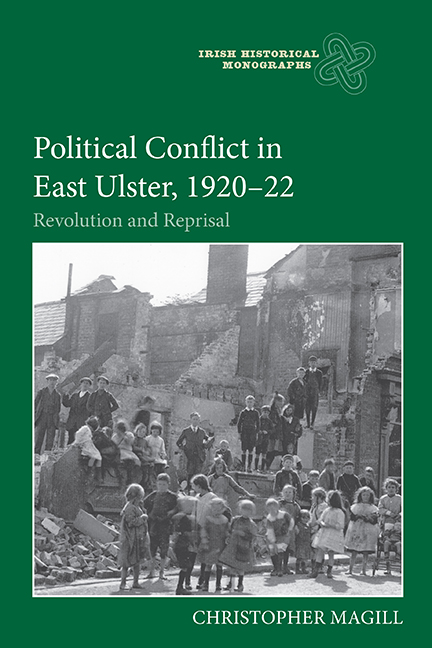Book contents
- Frontmatter
- Dedication
- Contents
- List of Illustrations
- Acknowledgements
- Abbreviations
- A Note on Terminology
- Map
- ‘Cork Justice Travelled a Long Way’: the Assassination of District Inspector Oswald Swanzy
- 1 From Moderates to Militants: the Unionist Community in East Ulster
- 2 Reprisal: the East Ulster Riots
- 3 ‘A Vital But Unenviable Task’: Understanding Loyalist Violence
- 4 A Protestant Force: the Social Composition of the B Specials
- 5 The Wilder the Better? Explaining the Violence of the Ulster Special Constabulary
- 6 A Misunderstood Minority: Irish Nationalists
- Conclusion
- Bibliography
- Index
- Irish Historical Monographs Previous Volumes
6 - A Misunderstood Minority: Irish Nationalists
Published online by Cambridge University Press: 21 October 2020
- Frontmatter
- Dedication
- Contents
- List of Illustrations
- Acknowledgements
- Abbreviations
- A Note on Terminology
- Map
- ‘Cork Justice Travelled a Long Way’: the Assassination of District Inspector Oswald Swanzy
- 1 From Moderates to Militants: the Unionist Community in East Ulster
- 2 Reprisal: the East Ulster Riots
- 3 ‘A Vital But Unenviable Task’: Understanding Loyalist Violence
- 4 A Protestant Force: the Social Composition of the B Specials
- 5 The Wilder the Better? Explaining the Violence of the Ulster Special Constabulary
- 6 A Misunderstood Minority: Irish Nationalists
- Conclusion
- Bibliography
- Index
- Irish Historical Monographs Previous Volumes
Summary
I
The perception, shared by many loyalists and Unionist politicians, that all Catholics were sympathetic to republicanism influenced unionist attitudes and policies towards the northern minority. This view of nationalism was particularly simplistic in the context of north-east Ireland. While the prospect of Irish Home Rule had largely vanished with Sinn Féin's electoral demolition of the Irish Parliamentary Party in December 1918, constitutional nationalism had managed to survive in Ulster. Despite this striking exception to the national trend, the failure of republicanism to win mass support among the Catholic community of east Ulster has received limited attention from historians.
The historiography of northern nationalism during the revolutionary period is largely confined to studies of high politics. In light of the subsequent emergence of the civil rights movement, many attempts have been made to assess the roots of Catholic disadvantage in Northern Ireland. The years 1921 to 1925 were formative ones, as nationalist non-cooperation with the government and institutions of the state, as well as patterns of Unionist prejudice, profoundly affected the position of Catholics within the new state. It has been argued that although the Unionist government ‘did genuinely try to create a nonsectarian [sic] state in which all citizens would enjoy equal rights’, the nationalist response of non-recognition proved counterproductive. Along with the consequences of IRA violence, which further reinforced the perception of nationalists as a disloyal minority, this strategy was seen to compound the marginalisation of nationalists. F. S. L. Lyons asserted that the instinct of the Catholic community ‘to hold themselves absolutely apart’ undermined its interests: the absence of nationalist participation in the Lynn Commission on education, for example, meant that the concerns of the Catholic Church were not considered, leaving unionists free to shape the state's educational policies to their own needs. In general, the unionist aim to ‘Protestantize’ Northern Ireland in the first decade of its existence was made easier by the absence of nationalist participation. Describing nationalist abstention as ‘disastrous’, Marianne Elliot suggested that ‘things were still open to change’ in the state's early years. However, a more nuanced interpretation might consider the extent to which nationalist attitudes were a response to the refusal of Unionist leaders to pursue conciliatory policies.
- Type
- Chapter
- Information
- Political Conflict in East Ulster, 1920–22Revolution and Reprisal, pp. 138 - 176Publisher: Boydell & BrewerPrint publication year: 2020



